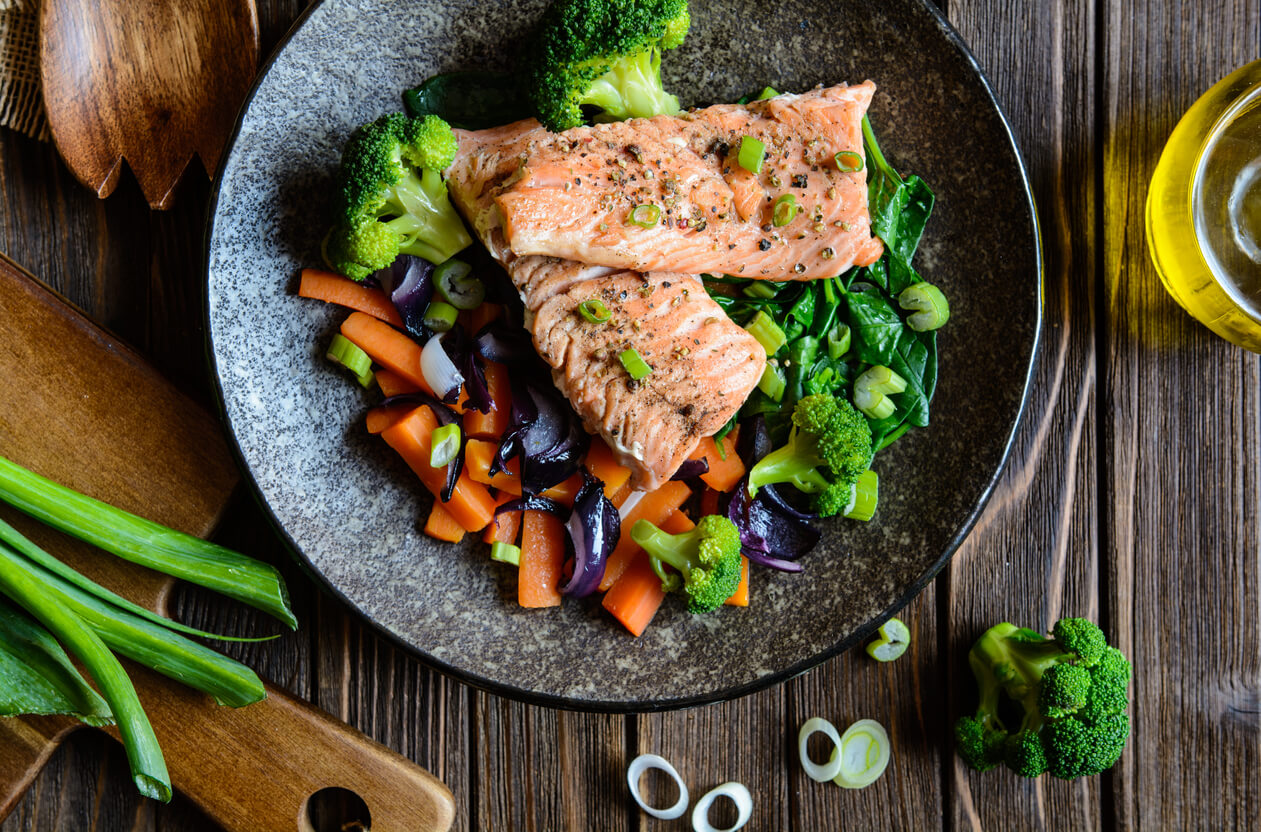3 Foods that Help Children Grow

There are a number of foods that help children grow and that should be included in their diet on a regular basis. We’re mainly talking about fresh products with high nutritional density, which should predominate in a varied and balanced diet to make the most of them.
Before starting, it’s important to note that optimizing nutrition during the early stages of life is a priority, as it helps the body to function properly and prevents the development of certain diseases in the future. In addition, childhood is the best time to establish good habits that will last throughout the years.
Know the best foods that help children grow
Here, we’re going to show you 3 of the best foods that help children grow. It’s important to make sure that the diet doesn’t lack any of the essential nutrients they offer. Otherwise, the good functioning of the organism of your little one could be put at risk. Take note!
1. Veal
Veal is one of the best sources of protein that can be included in your children’s diet. These nutrients are determinants to achieving the growth of the body and good muscular health. Also, they’ll make a difference in terms of sports recovery, as they’re in charge of repairing the damage produced in the tissues after physical activity.
In fact, children need a higher protein intake than adults in their diet, as they’re in the midst of growing. According to research published in the Annals of Nutrition & Metabolism, infants require at least 1 gram of protein per kilogram of weight per day. And when they maintain a high level of physical activity, the dose should be increased to at least 1.5 grams per kilogram of body weight.
Gone is the myth that high-protein diets can negatively affect kidney or liver function. Also, the theory that these approaches cause bone problems in the medium term, due to increased renal elimination of calcium, has been demolished.

2. Rice
Complex carbohydrates are also necessary in the infant diet to help children grow. They’re broken down into glucose, one of the elements that activate the body’s anabolic pathways. Among them, the mTOR pathway, which is closely linked to muscle tissue growth processes, according to a study published in Cell.
Leucine (essential amino acid) also performs this function, so we know that proteins and carbohydrates act together in the body to promote development.
However, it’s essential to ensure that most dietary carbohydrates are of the complex type, as they’re absorbed more slowly and have less impact on blood sugar levels. Otherwise, alterations in the proper functioning of the metabolism could be experienced.

3. Salmon
Not only proteins and carbohydrates are important for the proper growth of children. So are the fatty acids of the omega-3 series.
First of all, fats help to prevent the destruction of muscle proteins, which prevents the deterioration of the function of this tissue. They also have an anti-inflammatory effect and prevent the development of many complex diseases.
Fatty acids are also crucial for the development and proper functioning of the central nervous system in children.
However, many children’s diets are deficient in these nutrients. Omega-3 fatty acids are mainly found in oily fish. Therefore, it’s best to consume these foods at least a couple of times a week, to meet the body’s essential needs.

Include in the diet foods that help children grow
As you’ve seen, there are several foods that help children grow properly, so it’s essential that they appear in the diet on a frequent basis. All of them are a source of essential nutrients and contribute to maintaining an optimal state of health, which prevents the development of chronic and complex diseases throughout life.
Finally, it’s essential to emphasize the need to maintain a series of healthy habits, beyond food. It’s important to encourage regular exercise from the first years of life, hydrate properly with water, and maintain good sleep hygiene every day.
There are a number of foods that help children grow and that should be included in their diet on a regular basis. We’re mainly talking about fresh products with high nutritional density, which should predominate in a varied and balanced diet to make the most of them.
Before starting, it’s important to note that optimizing nutrition during the early stages of life is a priority, as it helps the body to function properly and prevents the development of certain diseases in the future. In addition, childhood is the best time to establish good habits that will last throughout the years.
Know the best foods that help children grow
Here, we’re going to show you 3 of the best foods that help children grow. It’s important to make sure that the diet doesn’t lack any of the essential nutrients they offer. Otherwise, the good functioning of the organism of your little one could be put at risk. Take note!
1. Veal
Veal is one of the best sources of protein that can be included in your children’s diet. These nutrients are determinants to achieving the growth of the body and good muscular health. Also, they’ll make a difference in terms of sports recovery, as they’re in charge of repairing the damage produced in the tissues after physical activity.
In fact, children need a higher protein intake than adults in their diet, as they’re in the midst of growing. According to research published in the Annals of Nutrition & Metabolism, infants require at least 1 gram of protein per kilogram of weight per day. And when they maintain a high level of physical activity, the dose should be increased to at least 1.5 grams per kilogram of body weight.
Gone is the myth that high-protein diets can negatively affect kidney or liver function. Also, the theory that these approaches cause bone problems in the medium term, due to increased renal elimination of calcium, has been demolished.

2. Rice
Complex carbohydrates are also necessary in the infant diet to help children grow. They’re broken down into glucose, one of the elements that activate the body’s anabolic pathways. Among them, the mTOR pathway, which is closely linked to muscle tissue growth processes, according to a study published in Cell.
Leucine (essential amino acid) also performs this function, so we know that proteins and carbohydrates act together in the body to promote development.
However, it’s essential to ensure that most dietary carbohydrates are of the complex type, as they’re absorbed more slowly and have less impact on blood sugar levels. Otherwise, alterations in the proper functioning of the metabolism could be experienced.

3. Salmon
Not only proteins and carbohydrates are important for the proper growth of children. So are the fatty acids of the omega-3 series.
First of all, fats help to prevent the destruction of muscle proteins, which prevents the deterioration of the function of this tissue. They also have an anti-inflammatory effect and prevent the development of many complex diseases.
Fatty acids are also crucial for the development and proper functioning of the central nervous system in children.
However, many children’s diets are deficient in these nutrients. Omega-3 fatty acids are mainly found in oily fish. Therefore, it’s best to consume these foods at least a couple of times a week, to meet the body’s essential needs.

Include in the diet foods that help children grow
As you’ve seen, there are several foods that help children grow properly, so it’s essential that they appear in the diet on a frequent basis. All of them are a source of essential nutrients and contribute to maintaining an optimal state of health, which prevents the development of chronic and complex diseases throughout life.
Finally, it’s essential to emphasize the need to maintain a series of healthy habits, beyond food. It’s important to encourage regular exercise from the first years of life, hydrate properly with water, and maintain good sleep hygiene every day.
All cited sources were thoroughly reviewed by our team to ensure their quality, reliability, currency, and validity. The bibliography of this article was considered reliable and of academic or scientific accuracy.
- Richter, M., Baerlocher, K., Bauer, J. M., Elmadfa, I., Heseker, H., Leschik-Bonnet, E., Stangl, G., Volkert, D., Stehle, P., & on behalf of the German Nutrition Society (DGE) (2019). Revised Reference Values for the Intake of Protein. Annals of nutrition & metabolism, 74(3), 242–250. https://doi.org/10.1159/000499374
- Saxton, R. A., & Sabatini, D. M. (2017). mTOR Signaling in Growth, Metabolism, and Disease. Cell, 168(6), 960–976. https://doi.org/10.1016/j.cell.2017.02.004
This text is provided for informational purposes only and does not replace consultation with a professional. If in doubt, consult your specialist.








